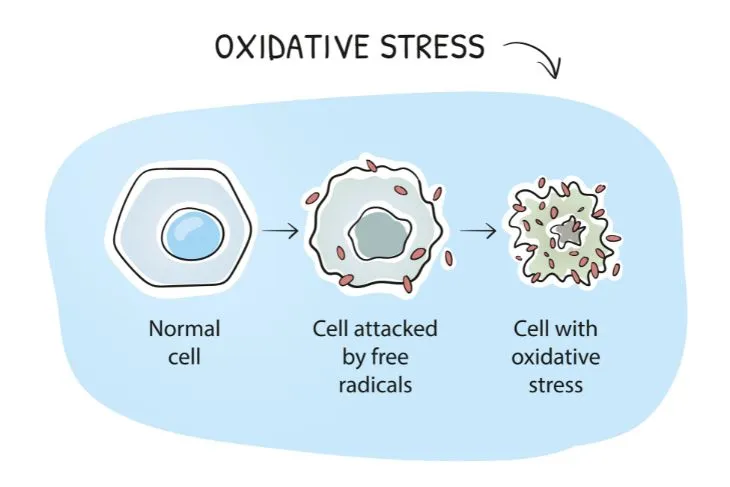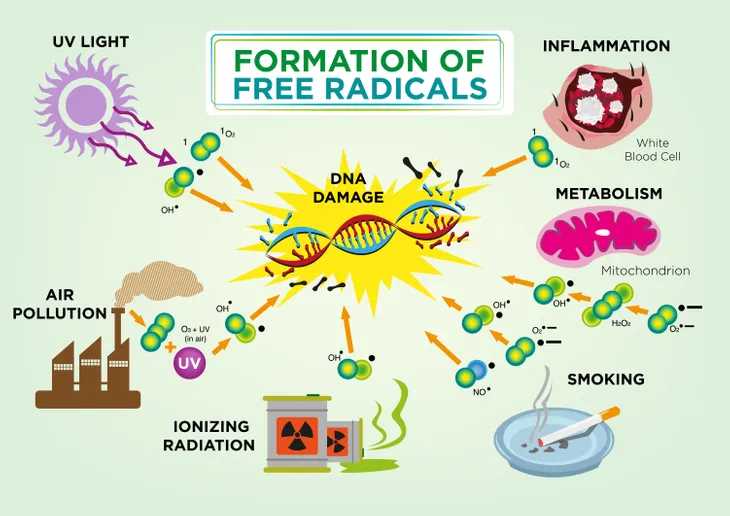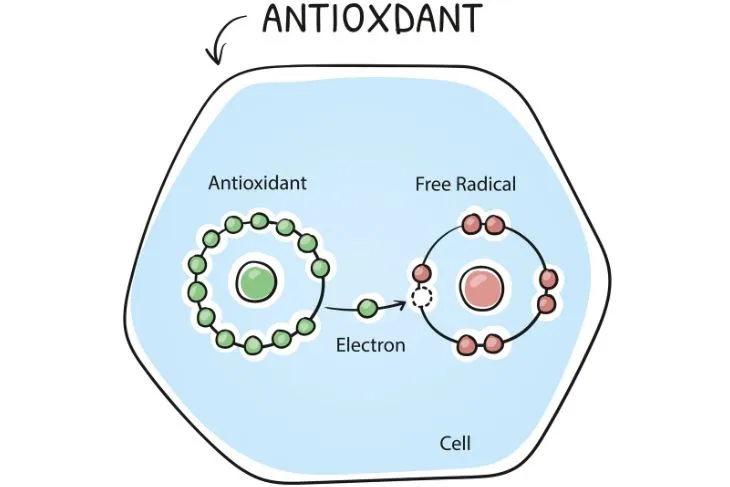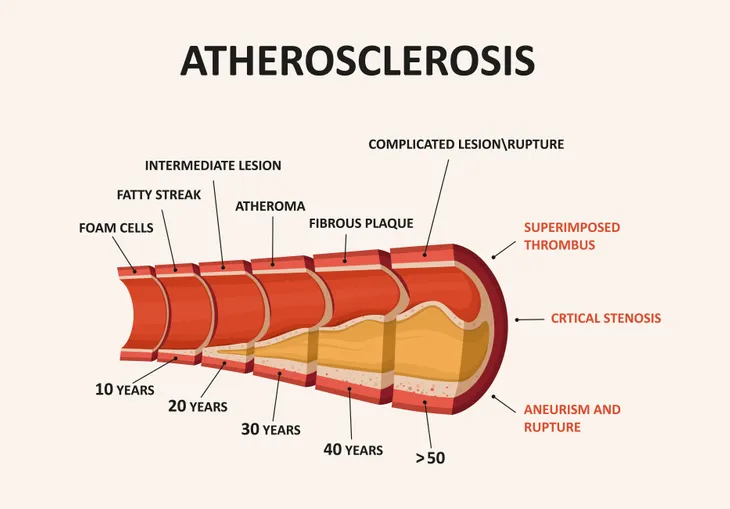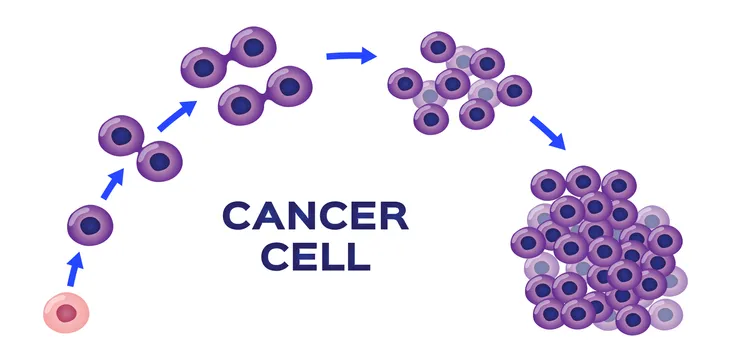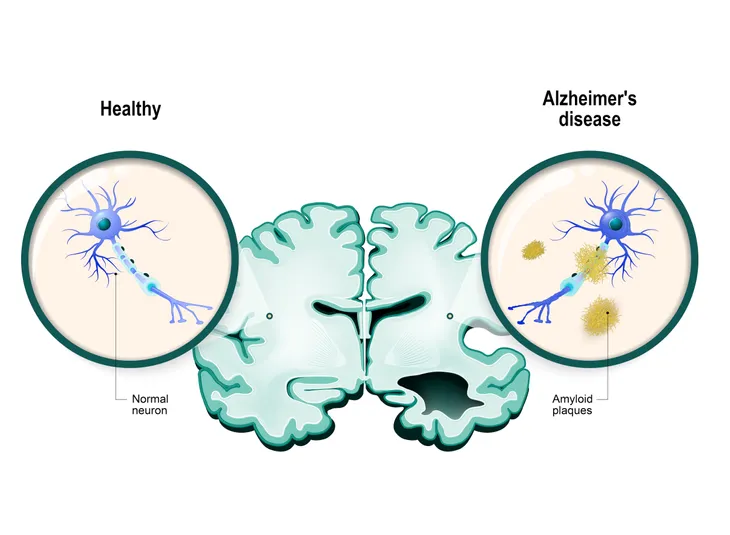- Oxidative stress occurs when there is an imbalance of free radicals and antioxidants in the body.
- If it occurs naturally from exercise or temporarily to fight infection or repair tissue damage, it’s good, however long-term oxidative stress can be dangerous.
- Long-term oxidative stress puts a person at risk for heart failure, stroke, neurodegenerative diseases, hypertension, and chronic inflammation.
- We can prevent oxidative stress by making healthy lifestyle choices, from regular exercise to eating healthier.
We’re all familiar with stress and likely deal with it on a weekly, if not daily basis. It can be short lived, or last for days or weeks at a time. The fact is, we all deal with it on some level, whether our problems are big or small. One form of stress most people likely haven’t heard of is oxidative stress which is the result of an imbalance of free radicals and antioxidants in the body.
Most of the effects we commonly associate with stress are mental (i.e. anxiety, nervousness, fear), however with oxidative stress the effects are physical. While these can sometimes be beneficial, long-term oxidative stress damages the body’s cells, proteins, and DNA. Here’s a look into what oxidative stress is, the effects, and how we can prevent it…
What is Oxidative Stress?
Oxidative stress occurs when there is an imbalance of free radicals and antioxidants in the body. “The body’s cells produce free radicals during normal metabolic processes,” writes Medical News Today. “However, cells also produce antioxidants that neutralize these free radicals.” Most of the time, our body is able to balance antioxidants and free radicals.
The development of oxidative stress and excess free radical production can be a result of diet, lifestyle choices, certain conditions, or environmental factors (i.e. pollution and radiation). Our body can also naturally trigger oxidative stress as a temporary immune response. This usually leads to inflammation that subsides after our immune system fights off an infection or repairs an injury, explains Medical News Today. However, unnatural or long-term oxidative stress can be harmful.
What are Free Radicals?
Now that we know oxidative stress is caused by an imbalance of free radicals and antioxidants, we need to dig deeper and define what exactly free radicals are. According to Medical News Today, free radicals are molecules with one or more unpaired electrons. Some examples are superoxide, hydroxyl radical, and nitric oxide radical.
“Cells contain small structures called mitochondria, which work to generate energy in the form of adenosine triphosphate (ATP),” writes the source. “Mitochondria combine oxygen and glucose to produce carbon dioxide, water, and ATP.” Free radicals are born out of this metabolic process. Free radicals can also come from external sources like smoke, pesticides, and ozone.
Understanding Antioxidants
We often hear a lot about antioxidants when talking about both our health and the foods that we choose. Some are high in antioxidants (i.e. vitamin A, C, and E) which we assume makes them healthy, but do we really known what they are? Medical News Today explains that antioxidants are substances that neutralize or remove free radicals. They do this by donating an electron. This neutralization process helps protect our body from oxidative stress.
Similar to free radicals, Medical News Today says we can get antioxidants from several different sources. Our body naturally produces some on its own. For example, “cells naturally produce antioxidants such as glutathione,” writes the source. We can also get them from our diet. Foods that are high in antioxidants provide our body with vitamins and minerals it can’t make on its own.
Benefits of Oxidative Stress
Oxidative stress is tricky to understand because it’s both good and bad for us. If it is short term, the effects are positive. For example, the oxidative stress that results from physical activity can be quite beneficial to the body, says Medical News Today. “Exercise increases free radical formation, which can cause temporary oxidative stress in the muscles,” writes the source. “However, the free radicals formed during physical activity regulate tissue growth and stimulate the production of antioxidants.”
The source also cites a 2015 study which found that mild oxidative stress can protect our body from infection and disease, such as limiting the spread of melanoma cancer cells. On the flip side of this, long-term oxidative stress can damage the body’s cells, proteins, and DNA. It contributes to aging and may lead to a range of health conditions.
Effects of Long-Term Oxidative Stress
Hypertension
High blood pressure, also known as hypertension, is a common condition that affects millions of people in the U.S. According to WebMD, more than 50 million Americans experience systolic hypertension. This condition increases a person’s risk for vascular diseases, and if left untreated can increase the risk of heart attack, stroke and other serious health problems, warns the Mayo Clinic.
Experts have found a link between oxidative stress and hypertension. It acts as a bridge between hypertension and atherosclerosis. “When the enzyme oxidase, which prevents oxidative stress, is not activated, hypertension is prevalent,” writes WebMD.
Atherosclerosis
This obscure condition is a specific type of arteriosclerosis. It occurs as a result of a buildup of fats, cholesterol and other substances on the artery walls, says the Mayo Clinic. The buildup that occurs is commonly referred to as plaque which results in a narrowing of the arteries, making it harder for blood to flow. It can also burst and lead to a blood clot.
Oxidative stress is a recipe for atherosclerosis. This is because when antioxidants are low in the body and inflammation is high, particularly in the blood vessels, atheromatous plaque forms, explains WebMD. “This buildup and circulating low-density lipoproteins, or bad cholesterol get oxidized by the free radicals,” writes WebMD. “This leads to the creation of new cells and accumulation of lipids, which can cause plaque buildup and heart problems.”
Cardiovascular Disease, Heart Failure and Stroke
A body that is under oxidative stress is at high risk of cardiovascular disease (CVD). The body is vulnerable without the healing properties of antioxidants. In addition to stress, other factors that increase a person’s risk for CVD are smoking, unhealthy diet, obesity, and hyperglycemia. “Oxidative stress impacts your cholesterol levels, which can lead to plaque buildup and vascular disease.”
The body is also at risk for a stroke when it’s as unbalanced as it is with oxidative stress. According to WebMD, studies have found that oxidative stress can cause ischemia-induced brain injury which happens from DNA damage along with protein oxidation. Less antioxidants in the body means more change of cerebral damage if a stroke does happen.
Lastly, oxidative stress can cause chronic heart failure as a result of the reduced antioxidant levels. These antioxidants are important for prevention cardiac hypertrophy, cardiac myocyte apoptosis, and myocardial stunning, says WebMD. “These conditions lead to heart failure, and when they’re not slowed down they can have dangerous effects,” writes the source.
Cancer and Chronic Inflammation
Oxidative stress may cause cancer when cellular and molecular alterations are triggered, says WebMD. “Through oxidative stress, oxidative DNA damage can stimulate cancer growth in your body,” writes the source.
It can also cause chronic inflammation. When oxidative stress occurs naturally in the body, there may be some inflammation, but it goes away after the immune system eliminates whatever it is battling (i.e. infection or repairs damaged tissue). However, Medical News Today explains that oxidative stress can also trigger an inflammatory response which starts this vicious cycle of producing more free radicals, leading to more oxidative stress.
Chronic inflammation has also been linked to diabetes, cardiovascular disease, and arthritis.
Neurodegenerative Diseases
According to Medical News Today, oxidative stress may also lead to neurodegenerative diseases like Alzheimer’s and Parkinson’s disease. The source refers to a 2018 review which looked into why the brain is so vulnerable to oxidative stress. Their findings showed that the brain consumes 20-percent of the oxygen the body uses to fuel itself.
“Brain cells use oxygen to perform intense metabolic activities that generate free radicals. These free radicals help support brain cell growth, neuroplasticity, and cognitive functioning,” writes Medical News Today. When oxidative stress occurs, the excess free radicals can damage the brains cells and even lead to their demise, increasing the risk of Parkinson’s disease.
In the case of Alzheimer’s, oxidative stress alters essential proteins, such as amyloid-beta peptides, says Medical News Today. A 2018 systematic review found that “oxidative stress may modify these peptides in a way that contributes to the accumulation of amyloid plaques in the brain.” These plaques are a key marker for Alzheimer’s.
Risk Factors for Oxidative Stress
We all produce some amount of free radicals in our body naturally through processes like exercise and inflammation, says Healthline. When this occurs, it’s not harmful. In fact, it’s beneficial and is a normal part of our body’s intricate system that works to keep us healthy.
However, Healthline points out that free radicals can also be influenced by outside factors, such as the environment. Other sources include: the ozone, certain pesticides and cleaners, cigarette smoke, radiation, and pollution. “A diet high in sugar, fat, and alcohol may also contribute to free radical production,” warns the source.
Prevention: Diet
It’s impossible to avoid free radicals and oxidative stress entirely, but we can do things to minimize its effects. To do so, we need to focus on increasing the amount of antioxidants in the body and decreasing the formation of free radicals. An easy way to do this is through diet. If we eat five servings of a variety of fruits and vegetables each day, Healthline says we can provide our body what it needs to produce antioxidants.
Healthline also includes a list of the best fruits and vegetables to eat which includes: berries, cherries, citrus fruits, dark leafy greens, prunes, broccoli, carrots, tomatoes, and olives. Other dietary sources of antioxidants are fish and nuts, vitamin E, green tea, turmeric, cinnamon, garlic, onion, vitamin C, and melatonin.
Prevention: Lifestyle Choices
In addition to diet, there are many lifestyle choices we can make on a regular basis to prevent or reduce the occurrence of oxidative stress in our body. The first is to partake in regular, moderate exercise. Physical activity is associated with so many amazing health benefits, one of which is higher natural antioxidant levels and reduced damage by oxidative stress. According to Healthline, people who exercise live longer, age better, and are less likely to develop cancer or other diseases.
Other things Healthline suggests we do is quit or not smoke and be cautious with chemicals. This includes cleaning chemicals or pesticides used on food or our garden. Be environmentally friendly by carpooling when possible. This will help reduce the free radical production for not only ourselves, but also our community. Healthline also notes we should wear sunscreen to prevent against ultraviolet light damage, drink moderately, get plenty of sleep, and avoid overeating.

